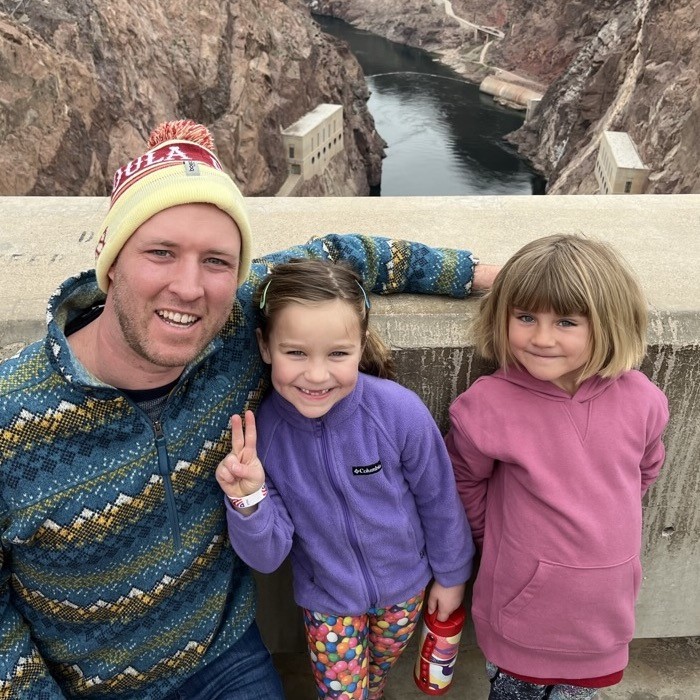Montana Climate Office Introduces the CSKT PurpleAir Air Quality Sensor Network
The Confederated Salish & Kootenai Tribes (CSKT) and the Montana Climate Office (MCO) are excited to announce the launch of the CSKT PurpleAir Air Quality Sensor Network, an integral part of the Native Drought Resilience project. Native Drought Resilience is a collaborative effort between CSKT, Salish Kootenai College, the Montana Climate Office at the University of Montana, and the Wilderness Society. Funded by NOAA’s National Integrated Drought Information System, Native Drought Resilience aims to enhance drought and climate resilience and education across the Flathead Reservation.
Project Overview
Native Drought Resilience is implementing several actions outlined in the updated CSKT Climate Change Strategic Plan. A key component is the installation and maintenance of a network of low-cost PurpleAir air quality sensors throughout the Flathead Reservation. PurpleAir sensors are WiFi-enabled and continuously measure fine particle pollution (PM2.5), offering a local view of wildfire smoke, air pollution, and potential health impacts.
This network builds upon previous PurpleAir sensor deployments funded by Montana Health Professionals for a Healthy Climate (MontanaHPHC) and the Montana Department of Environmental Quality (DEQ), as well as several PurpleAir sensors deployed on the Flathead Reservation by private individuals. With NIDIS funding, the Native Drought Resilience team has installed sensors both indoors and outdoors at essential community locations, including schools, health centers, and Tribal government offices.
Flathead Reservation residents can use these sensors for real-time health and safety assessments, while educators can incorporate air quality data into environmental science and health curricula such as those available from the Native Climate project.
Real-Time Monitoring
Access the real-time PurpleAir sensor data on an interactive map at the following link: https://climate.umt.edu/cskt-air-quality/. Data from the CSKT Air Quality network are also available on the AirNow Fire and Smoke Map.
Project Leadership
- Kyle Bocinsky and Maureen McCarthy (Montana Climate Office)
- Mike Durglo (CSKT, Cultural Preservation)
- René Dubay (Salish Kootenai College Extension)
PurpleAir Sensor Locations
Currently, the CSKT PurpleAir Air Quality Sensor Network includes 38 sensors deployed across the Flathead Reservation at the following locations:
- CSKT Bison Range Visitors Center (indoor and outdoor)
- Salish Kootenai College Extension (indoor and outdoor)
- CSKT Elementary, Middle, and High Schools (indoor and outdoor)
- Arlee High School *+
- Charlo High School
- Dayton Elementary
- Hot Springs High School *
- Polson High School
- Polson Middle School *
- Ronan High School *
- Ronan Middle School
- St. Ignatius High School *
- Dixon Elementary (monitors forthcoming)
- CSKT Tribal Health Buildings (indoor and outdoor)
- Arlee Health Center
- St. Ignatius Health Center
- Ronan Health Center
- Salish Kootenai College Health Center
- Polson Health Center
- Elmo Health Center
- Hot Springs Health Center
- Kicking Horse Health Center
* PurpleAir sensor installed through MontanaHPHC.
+ PurpleAir sensor installed through the Montana DEQ.
Live Map
The latest data from the CSKT PurpleAir Air Quality Sensor Network is available through a live map at https://climate.umt.edu/cskt-air-quality/, or simply click on the map below:
Instrumentation
The PurpleAir Zen measures real-time PM2.5 levels and features a full-color LED for instant air quality indication. Built-in WiFi allows data transmission to the real-time PurpleAir Map, accessible via any smart device. For areas with limited WiFi, the Zen includes a real-time clock and SD card capabilities for data storage. The monitor features replaceable PMS6003 laser counters and an expansion port for future upgrades. More information about the technology used in PurpleAir sensors is available on the PurpleAir website.
Background
The Confederated Salish & Kootenai Tribes (CSKT) of the Flathead Reservation were pioneers in drafting a Climate Change Strategic Plan in 2013, updated in 2016. This plan emphasizes understanding drought impacts on forests, water and air quality, and critical resources while developing a drought management plan.
In 2020, the CSKT Climate Change Advisory Committee (CCAC) began a new revision to the CSKT Climate Change Strategic Plan. This new “living” plan outlines climate impacts and resilience actions that the tribes are undertaking to mitigate these effects. CSKT climate resilience efforts blend traditional ecological knowledge (TEK) with Western scientific understanding to address climate challenges such as drought, wildfires, and extreme weather.
The CSKT Climate Change Strategic Plan has received support from The Wilderness Society, Crown Managers Partnership Hi5 Working Group, Native Waters on Arid Lands, Native Climate, and the Montana Climate Office. Implementation actions are funded through individual CSKT departments, including Natural Resources, Fire Management, the Salish & Kootenai Housing Authority, and Cultural Preservation.
Council Approval
The CSKT Tribal Council approved the installation of PurpleAir monitors as part of the Native Drought Resilience project on August 17, 2023.
Project Contacts
-
Kyle Bocinsky
Director of Climate Extension
Montana Climate Office, University of Montana
Email: kyle.bocinsky@umontana.edu
Phone: (770) 362-6659 -
Michael Durglo, Jr.
Climate Change Coordinator
Climate Change Advisory Committee Chairman
Confederated Salish and Kootenai Tribes
Email: michael.durglo@cskt.org
Phone: (406) 261-8903
About the Montana Climate Office
The Montana Climate Office provides high-quality, timely, relevant, and scientifically based climate, drought and water resources information and services to Montanans. As Montana’s official climate data stewards, we strive to provide information for specific sectors of interest by either geography or industry, and assist stakeholders in adapting climate products to their needs. The MCO leads the development of the Montana Mesonet, a cooperative statewide soil moisture and meteorological information network that supports decision-making in agriculture, range, and forested watershed contexts. The MCO is part of the Montana Forest and Conservation Experiment Station in the WA Franke College of Forestry and Conservation at the University of Montana.
